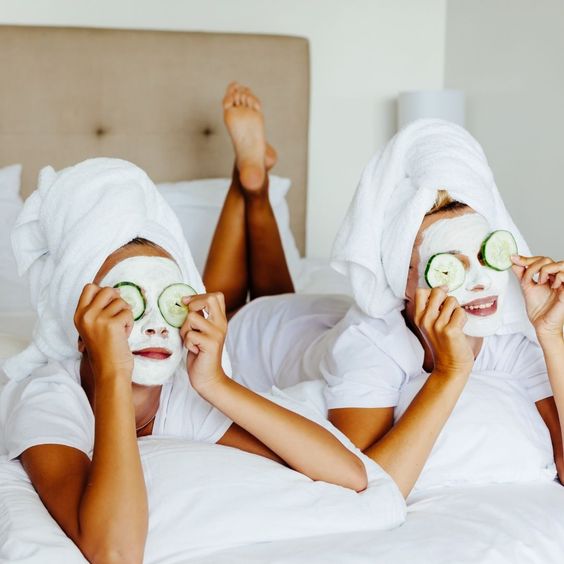Yes, we said it. Although it does mean something different
than snacking in bed.
Life moves at a rapid pace, even during a pandemic. If we’re not staring at our screen for hours, we’re walking, running, or doing other forms of exercise. But according to ELLE US colleague Kate Carraway, we should certainly take it a bit easier, because after all, resting is just as important as sports. And guess what? Also just as effective. She tells her story below.
Recently, I found myself working 40 hours in just three days while writing and updating a draft of a text – the high-intensity interval training of life as a writer. To maintain this pace, I slept eight hours a day, exercised daily, and took breaks to eat the
(semi-healthy) meals my husband prepared. But on the fourth day, the words on my screen were accomplished synchronized swimmers. My focus was hard to find, I could no longer form coherent sentences and was constantly shaking. I was so out of touch that I fell three steps down, caught myself just dropping the rest of the way, then suddenly stunned and hazy at the bottom of the stairwell. I knew I would get sick if I continued like this longer.
Why doing nothing is good for you
Culturally, we recognize terms such as ‘digital overwhelm’ and ‘millennial burnout’, but we will continue to conduct ourselves to work towards this. Even when I’m away from my computer during my routine of running, showering and eating, I listen to podcasts or
scroll through Instagram, completely immersed in the digital world. What I never did was daydream, or just stare ahead, or do any kind of inaction.
This is what is called ‘waking rest’. In a letter to the editor of Sleep science magazine last year, researchers at the Occupational Sleep Medicine Group in Washington described awake rest as a fourth puzzle piece. An addition to the well-known trio:
exercise, eat and sleep. Resting awake is a ‘period of silence’ and, in fact, mindfulness, where ‘the brain is given time to reflect reflectively and process what comes to mind,’ says Amanda Lamp, PhD. It is consciously stepping out of your own thoughts, deadlines and to-do lists and anything you think is important, and giving your brain time for what to process or think about and prepare for what is going to come.’ Just what I didn’t do during my three-day screen addiction.
While related concerns have been expressed about sleep, mindfulness, minimalism, slow living and self-care, these are all temporary obsessions with our well-being, none that specifically address the importance of being awake without taking time, the essential idleness of rest. Defining rest is both unknown and essential. We can talk about the practical differences between rest, relaxation, laziness, leisure, fun, conviviality and enjoyment. And that while an average day, and therefore an average
life, is completely occupied with doing something. Those of us who are genuinely concerned with our balance are likely to put meditation on the agenda, but again we see it as a to-do for the good of our health and productivity. During awake rest you can fold or sweep the laundry or do another task without actually doing anything mentally – and then without music, says Lamp. “The problem is, if you really like a song, you are there for the song, so you don’t have room to rest awake,” she explains.
Consciously resting is not that easy
Another thing to consider is what Alex Soojung-Kim Pang, the author of Rest: Why You Get More Done When You Work Less, describes as “deliberate rest.” Other than the nothingness of awake rest, deliberate rest means choosing it, planning it, and paying attention to it. “What turns out to be an important component of rest is that we can get better at it,” says Pang, who also points out that “the most restorative rest is often physically challenging or mentally engaging.” So while awake resting makes me unplug completely and let my mind run wild, contemplated rest can be a ride on a bike, or play a game, or discuss the future of The Real Housewives of Beverly Hills with a friend.
Both awake and deliberate rest have the intention in common: “You need time to rest because then your subconscious mind can get to work,” Pang writes. He therefore
recommends working and resting in layers: ‘intensive work for four or five hours, often followed by (often immediately), a significant period of rest and doing nothing.’ (So don’t plod through your inbox.) The transition from work to rest must happen within minutes so that your subconscious mind can get to work with “all the information, judgments and decisions.” Pang adds, “Even when you’re out in the yard, going for a run, or walking the dog, your mind is still processing things, forming ideas, and trying out various possibilities.” Have you ever had a breakthrough in the shower? That’s why.
Pang says that the ‘highly successful’ people he studied take at least an hour or two a day for a contemplated rest. Author Malcolm Gladwell, who became known for his 10,000-hour rule to accomplish anything, says he tries to spend at least an hour in absolute silence every day, often walking or running. “No phone, no earphones, just an hour where I think my thoughts,” he recently told Gretchin Rubin’s podcast Happier. In other words, nothing may be the only way to do something.
This is how much time you really need to rest per day
Amanda Lamp says the amount of awake rest a person needs is based on factors such as screen time and time spent out, but she speculates that half an hour a day “even as a base of sorts, would probably be beneficial for everyone.” ‘ But longer periods of rest are just as important. Pang says an ideal vacation schedule would be a week to 10 days, every three months. Happiness peaks around the seventh day of the holiday, and psychological benefits last for about two months.
Filmmaker Tiffany Shlain’s new book, 24/6: The Power of Unplugging One Day a Week, describes her family tradition of ‘technology Shabbat’: no screens every Saturday for 24 hours, as a tech-oriented take on Jewish Shabbat, the traditional day of rest. . She says her tech-free Saturday has a knock-on effect during the week, supported by a number of offline hours per day, although she says that the daily breaks do not carry the same strength as the weekly digital-free day. “When your phone is nearby, it’s a constant negotiation in your head,” she says. This can lead to fatigue and even cause stress.
This is especially true for women, who often feel responsible for turning their free hours and interests into content: taking photos, editing, posting and then keeping track of followers and likes, which ultimately boils down to work.
Rest is also a feminist problem. Women have disproportionately less of it, carrying the cognitive load of working full-time and running a household, as well as doing emotional work. Using all of your available mental energy often means scrolling endlessly at the end of a long day instead of snuggling up in bed with a cup of tea. (A 2019 study found that teenage boys have about an hour more free time than teenage girls, so it starts early and lasts.)
Declutter your room, declutter your head
In the meantime, well, nothing happens: In Ottessa Moshfegh’s novel My Year of Rest and Relaxation (2018), a woman decides to sleep for a year using pills. In addition to being confusing, the fantasy is also completely recognizable to those of us who are alone for long periods and find silence completely acceptable. This ‘I’ll quit’ culture has almost become something of a new fashion trend, much like a fleece jacket, Teva and Birkenstock sandals and tie-dye. Marie Kondo’s method of disposing of possessions that do not spark joy is a multi-usable phenomenon: decluttering is a symbol of a collective desire to just stop doing everything.
A new generation of business and self-help books, like Tiffany Schlain’s, are shifting the focus from managing an excess in the lives of working women to eliminating it.
Female-centric media is growing suspicious of certain ‘progressive’ work ideals, such as the hustle-harder movement that encourages women to be ‘girl bosses’ and ‘boss
babes’, marching through careers they still punish for having children and they pay less because they are women. The current self-care trend is about saying no, doing less and setting boundaries. And there is the activist movement since 2016 protecting Gen Z and millennial women from the wealth inequality, student debt, stagnant hourly wages, and the toxic run on the project-based freelance economy. Jenny Odell’s 2019 book, How to Do Nothing: Resisting the Attention Economy, is a more radical and philosophical approach to this refusal trend, which includes tranquility; she writes “the” nothing “that I am proposing is just nothing from a capitalist productivity standpoint,” a view that complements both “awake” and “contemplated” rest.








